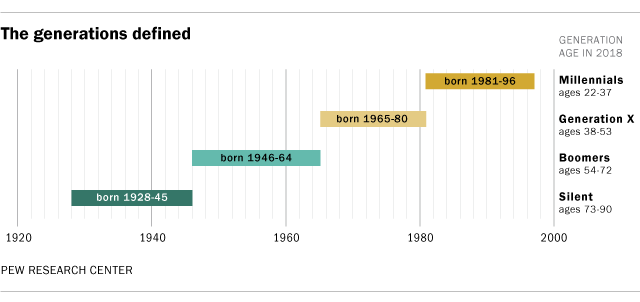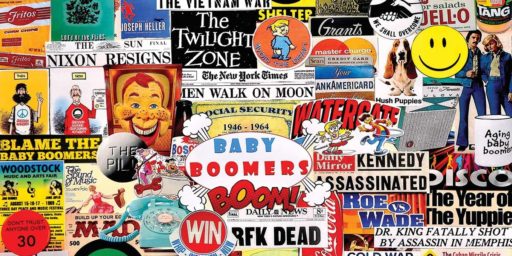Putting an End to the Millennial Generation
We form stereotypes about generational cohorts when they're very young and then freeze them.
Michael Dimock, president of Pew Research Center, explains how his organization is grappling with “Defining generations: Where Millennials end and post-Millennials begin.”
Pew Research Center has been studying the Millennial generation for more than a decade. But as we enter 2018, it’s become clear to us that it’s time to determine a cutoff point between Millennials and the next generation. Turning 37 this year, the oldest Millennials are well into adulthood, and they first entered adulthood before today’s youngest adults were born.
In order to keep the Millennial generation analytically meaningful, and to begin looking at what might be unique about the next cohort, Pew Research Center will use 1996 as the last birth year for Millennials for our future work. Anyone born between 1981 and 1996 (ages 22-37 in 2018) will be considered a Millennial, and anyone born from 1997 onward will be part of a new generation. Since the oldest among this rising generation are just turning 21 this year, and most are still in their teens, we think it’s too early to give them a name – though The New York Times asked readers to take a stab - and we look forward to watching as conversations among researchers, the media and the public help a name for this generation take shape. In the meantime, we will simply call them “post-Millennials” until a common nomenclature takes hold.
Generational cutoff points aren’t an exact science. They should be viewed primarily as tools, allowing for the kinds of analyses detailed above. But their boundaries are not arbitrary. Generations are often considered by their span, but again there is no agreed upon formula for how long that span should be. At 16 years (1981 to 1996), our working definition of Millennials will be equivalent in age span to their preceding generation, Generation X (born between 1965 and 1980). By this definition, both are shorter than the span of the Baby Boomers (19 years) – the only generation officially designated by the U.S. Census Bureau, based on the famous surge in post-WWII births in 1946 and a significant decline in birthrates after 1964.
Unlike the Boomers, there are no comparably definitive thresholds by which later generational boundaries are defined. But for analytical purposes, we believe 1996 is a meaningful cutoff between Millennials and post-Millennials for a number of reasons, including key political, economic and social factors that define the Millennial generation’s formative years.
Most Millennials were between the ages of 5 and 20 when the 9/11 terrorist attacks shook the nation, and many were old enough to comprehend the historical significance of that moment, while most post-Millennials have little or no memory of the event. Millennials also grew up in the shadow of the wars in Iraq and Afghanistan, which sharpened broader views of the parties and contributed to the intense political polarization that shapes the current political environment. And most Millennials were between 12 and 27 during the 2008 election, where the force of the youth vote became part of the political conversation and helped elect the first black president. Added to that is the fact that Millennials are the most racially and ethnically diverse adult generation in the nation’s history. Yet the next generation – those currently 21 or younger – is even more diverse.
Beyond politics, most Millennials came of age and entered the workforce facing the height of an economic recession. As is well documented, many of Millennials’ life choices, future earnings and entrance to adulthood have been shaped by this recession in a way that may not be the case for their younger counterparts. The long-term effects of this “slow start” for Millennials will be a factor in American society for decades.
I find the “generation” construct both fascinating and problematic. Dimock makes a reasonable case for 1996 as a stopping point but one could just as easily construct a case for 1992 or 2000. I was born at the tail end of 1965, so I’m among the earliest of the pre-Millennial generation that’s been dubbed “Generation X.” And, while I certainly have things in common with people born in 1980 (when I was a high school freshman) I surely have more in common with someone born in 1962, even though they’re “Baby Boomers.” Similarly, someone born in 1980 has more in common with someone born in 1982 than they do with me.
Further, public perception of these things is rather amusing. We tend to form stereotypes about generational cohort when they’re in their late teens and early 20s and then freeze them, as if they, unlike every generation before them, don’t mature over time as their life experiences shape them. And I continue to have students—especially those coming of recruiting duty—ranting about how different the Millennials are and how unsuited most of that cohort is for military service because yada, yada, yada. They’re stunned when I inform them that, actually, most of the seminar group are indeed Millennials—indeed, the Marine Corps has Millennial lieutenants colonel and sergeants major at this point—and even the youngest of that cohort are unlikely candidates for enlistment. Because their perceptions have been shaped by more senior leaders, they’ve come to think of “Millennials” as a code for “these kids today.” Who should get off our lawn.
UPDATE: Fellow Gen-Xer Garance Franka-Ruta, riffing on the same article:
Millennial: Remembers getting permission to use the Internet
Gen X: Remembers getting the Internet
and
Millennials: Remembers personally getting their first computer.
Gen X: Remembers using the first personal computers.
There are near-endless possibilities along those lines. Perhaps we should enlist the help of the good folks at Beloit College.







I also have objections to the ‘generational step ladder’ scheme. I was born during the brief period between VJ Day (look it up, kids) and Jan 1st, ’46. I was conceived before the Trinity nuclear test. I have always been lumped into the Boomer crew but never ‘felt’ like I quite fit.
My personal musings have gone in the direction of technical evolution affecting childhood being the cause of those distinctions that seem so obvious when viewing the population through it’s various age cohorts but disappear when taking a close examination. I have very clear memories of a time when no one in my (middle-class, southern) neighborhood had a TV. I recall very clearly having a favorite radio program and listening to it with a crystal radio.
I’m getting off here and making arrangements with a nursing home….
xkcd made a comic ages ago with someone grumbling about the “MTV generation” and the punchline is “Face it: Your problem with the MTV generation is their kids.” Admitting the kids have grown up also means admitting you’re getting *old*.
Think about it: we still have people using “hippy” as a pejorative and the stereotype permeates the right’s perception of the left over a half a century later. Once you get a stereotype in your head, it’s there for a LONG time. But if you ask a Boomer, the 60’s were not too long ago and those damn hippies are still around because otherwise they have to admit the hippies are literally dying off…. and so are they.
The generational boundaries generally used are silly. I prefer the Strauss-Howe definitions, which are based upon life experiences, especially as young adults, so that the boundary between Boomer and X is based upon whether they were worried about going to Vietnam, not based on how many people were born their year. As a result, they draw the Boomer-X line between 1960 and 61.
Reads headline “Putting An End To The Millennial Generation”: well, that’s one way to get those kids off your lawn once and for all.
Reads body: never mind.
@Gustopher: Yeah, I couldn’t resist 🙂 With the new excerpt-under-headline format, I figure it’s not too misleading.